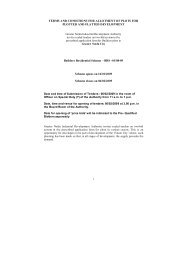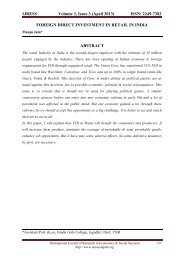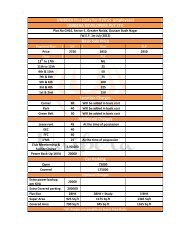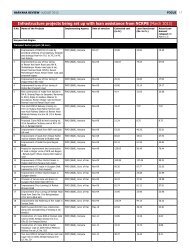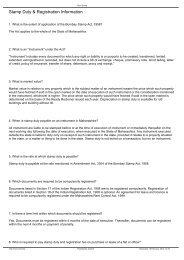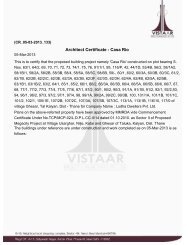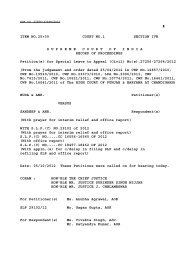eLegalix - Allahabad High Court Judgment Information System ...
eLegalix - Allahabad High Court Judgment Information System ...
eLegalix - Allahabad High Court Judgment Information System ...
You also want an ePaper? Increase the reach of your titles
YUMPU automatically turns print PDFs into web optimized ePapers that Google loves.
JUDGMENT/ORDER IN - WRIT - C No. 37443 of 2011 at <strong>Allahabad</strong> Dated-21.10....http://elegalix.allahabadhighcourt.in/elegalix/WebShow<strong>Judgment</strong>.doPage 182 of 19710/21/2011In Union of India Vs. Mukesh Hansh (supra), the argument was made before the apex court that when theappropriate Government comes to the conclusion that there is an urgency or unforeseen emergency underSection 17(1) and 17(2) the dispensation of the inquiry under Section 5-A becomes automatic. This argument wasrepelled by the Apex court in paragraph 33 which is quoted as below :An argument was sought to be advanced on behalf of the appellants that once the appropriate Governmentcomes to the conclusion that there is an urgency or unforeseen emergency under Section 17(1) and (2), thedispensation of enquiry under Section 5A becomes automatic and the same can be done by a composite ordermeaning thereby that there no need for the appropriate Government to separately apply its mind for any furtheremergency for dispensation with an inquiry under Section 5A. We are unable to agree with the above argumentbecause sub- section (4) of Section 17 itself indicates that the "government may direct that provisions of Section5A shall not apply" which makes it clear that not in every case where the appropriate Government has come tothe conclusion that there is urgency and under sub- section (1) or unforeseen emergency under sub-section (2) ofSection 17 the Government will ipso facto have to direct the dispensation of inquiry. For this we do find supportfrom a judgment of this <strong>Court</strong> in the case of Nandeshwar Prasad & Anr. vs. The State of U.P. & Ors. { 1964 ( 3)SCR 425) wherein considering the language of Section 17 of the Act which was then referable to waste or arableland and the U.P.Amendment to the said section held thus :"It will be seen that s. 17(1) gives power to the Government to direct the Collector, though no award has beenmade under s. 11, to take possession of any waste or arable land needed for public purpose and such landthereupon vests absolutely in the Government free from all encumbrances. If action is taken under s. 17(1), takingpossession and vesting which are provided in s. 16 after the award under s. 11 are accelerated and can takeplace fifteen days after the publication of the notice under s. 9. Then comes s.17(4) which provides that in case ofany land to which the provisions of sub-s. (1) are applicable, the Government may direct that the provisions of s.5-A shall not apply and if it does so direct, a declaration may be made under s. 6 in respect of the land at any timeafter the publication of the notification under s. 4(1). It will be seen that it is not necessary even where theGovernment makes a direction under s. 17(1) that it should also make a direction under s. 17(4). If theGovernment makes a direction only under s. 17(1) the procedure under s. 5-A would still have to be followedbefore a notification under s. 6 is issued, though after that procedure has been followed and a notification under s.6 is issued the Collector gets the power to take possession of the land after the notice under s. 9 without waitingfor the award and on such taking possession the land shall vest absolutely in Government free from allencumbrances. It is only when the Government also makes a declaration under s. 17(4) that it becomesunnecessary to take action under s. 5-A and make a report thereunder. It may be that generally where an order ismade under s. 17(1), an order under s. 17(4) is also passed; but in law it is not necessary that this should be so. Itwill also be seen that under the Land Acquisition Act an order under s. 17(1) or s. 17(4) can only be passed withrespect to waste or arable land and it cannot be passed with respect to land which is not waste or arable and onwhich buildings stand."Thus the view taken in Harischand case as extracted above that the District Magistrate having arrived atconclusion that land was required urgently and there was justification for acquiring the land was not sufficientrecommendation for dispensation of inquiry under Section 5-A and there being no application of mind to theaforesaid aspect which is specifically required to be considered, the judgement of the Division Bench inHarishchand can not the said to be in accordance with law as laid down by Apex court in Narayan Govind GavateVs. State of Maharashtra and Union of India Vs. Mukesh Hansh.The division Bench judgment in Harakaran Singh's case have referred to Anand Singh's case (supra) which hadrelied on Narayan Singh Gautey's case. The Division Bench in Harakaran Singh has also relied on RadheyShyam case (supra) which was fully applicable on the issues which have arisen in the present case. In view of theaforesaid discussion we are of the view that Division Bench judgment in Harishchand can not be approved andthe Division Bench judgment in Harakaran Singh is to be followed.In so far as other Division Bench judgments which had been relied by learned counsel for the respondents asreferred above upholding the notification we are of the view that said judgments had binding effect between theparties in the aforesaid cases. The present petitioners are not being party to those proceedings the said judgmentmay not be binding on the present petitioners. It is, however, relevant to notice one or two judgments in whichnotifications were upheld. One of the Division Bench judgments is relied by the respondent is Munshi Singh Vs.State of U.P. and others 2009 Volume VIII A.D.J. 360 by which judgment the notifications dated 20 June 2007under Section 4 and notification dated 18 June 2008 under Section 6 was challenged. The Division Benchdismissed the writ petition. The Division Bench while dismissing the writ petition has relied on Division Bench ofthis <strong>Court</strong> in Radhey Shyam and others Vs. State of U.P. 2009 Volume 2 A.D.J. 388. Against the judgment of





